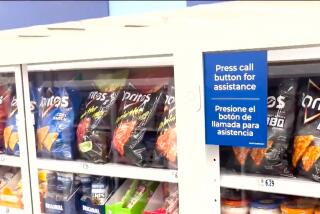Medco Loses Contract as Drug Retailers Shun It : Health care: The Maryland incident, which has sparked an investigation, reflects a wider problem.
- Share via
Medco Containment Services Inc. lost a $266-million contract with Maryland after drugstores refused to work with the managed-care company, prompting a state investigation of some of the largest retail pharmacy chains.
The state revoked the contract after about 60% of the state’s drugstore chains--including Rite Aid Corp., Giant Food Inc. and CVS Pharmacy Inc.--refused to fill prescriptions covered by Medco’s reimbursement plan. About 600 of the state’s 970 pharmacies refused to fill Medco’s prescriptions, in protest of the company’s low reimbursement rate.
The controversy in Maryland is representative of a wider problem in which drugstore operators feel vulnerable to powerful managed-care companies. Drug retailers hope their efforts in Maryland can help turn the tide.
The controversy has spurred an investigation by the state’s attorney general into whether the drug retailers were in collusion against Medco, the nation’s largest manager of prescription drug benefit programs for employers.
“We have been very disappointed in the process and the actions of the pharmaceutical community,” said Marita Brown, Maryland’s secretary of budget and fiscal planning.
Medco, based in Montvale, N.J., won the four-year contract in September, beating out 10 other bidders. It was to have managed the prescription plan of 92,000 state employees and retirees beginning Jan. 1.
The contract previously belonged to PCS Health Systems Inc., a unit of Eli Lilly & Co., which will continue as the state’s pharmacy benefits manager for 90 days until the contract can be rebid.
The Medco contract would have saved the state $66 million over the PCS contract now in place. “The state now will pay more to have prescriptions dispensed than do other health plans served by these same chains outside of Maryland,” a Medco statement said.
The state had given Medco, a unit of Merck & Co., several days to come up with a list of pharmacies that would participate in its plan. When the company could not, Brown said, the state had to cancel the contract and start the bidding process again.
“We had absolutely no confidence in Medco’s ability to provide an adequate network of pharmacies for our members and their dependents,” Brown said.
Although declining to provide details of the probe, Brown said the state is looking into whether drug chains decided together to wait until late December to say they would not work with Medco when they knew of the contract’s reimbursement rate for more than three months.
Representatives for the retailers said they did not decide as a group not to honor Medco prescriptions.
“Giant’s decision was a unilateral one, based solely on economics,” said Dave Rutstein, senior vice president and general counsel for Washington-based Giant, which runs 176 drugstores in Maryland.
In Rite Aid’s case, its Eagle Managed Care subsidiary also bid on the state contract and filed a bid protest after finding out that Medco’s proposal cited Rite Aid stores as part of its network, said Joel Feldman, senior vice president of Rite Aid and president of Eagle Managed Care. At the time the protest was filed, Rite Aid told government officials it would not participate in the program.
Eagle is considering bidding again for Maryland’s business, Feldman said.
The decision to shun Medco, executives said, was related to the company’s plan for reimbursing pharmacies.
“Filling the prescriptions was less profitable than not filling them,” said Stanton Ades, executive vice president and chief clinical officer for NeighborCare, a chain of 21 stores based in Baltimore. Company officials said they would lose at least $2 on each prescription filled.
Drugstores are reimbursed by pharmacy benefits managers such as Medco according to a contracted fee based on a percentage of an average wholesale price, or AWP, plus a dispensing fee. Pharmacies make a profit on the difference between the actual cost of the drug--usually lower than the AWP--and the reimbursement from the managed-care company.
This difference shrinks under the Medco plan, in which reimbursements deduct 15% from the AWP and add a $2 dispensing fee for brand-name drugs and a $2.50 fee for generic ones, executives said. Maryland’s previous plan, offered by PCS, paid 8% below the AWP, plus a $3.75 fee.
“This very well could send a message to the pharmacy benefits managers and plan sponsors--including state and federal government--that you don’t effect cost savings just by reducing reimbursements to pharmacies,” Ades said.
More to Read
Inside the business of entertainment
The Wide Shot brings you news, analysis and insights on everything from streaming wars to production — and what it all means for the future.
You may occasionally receive promotional content from the Los Angeles Times.







